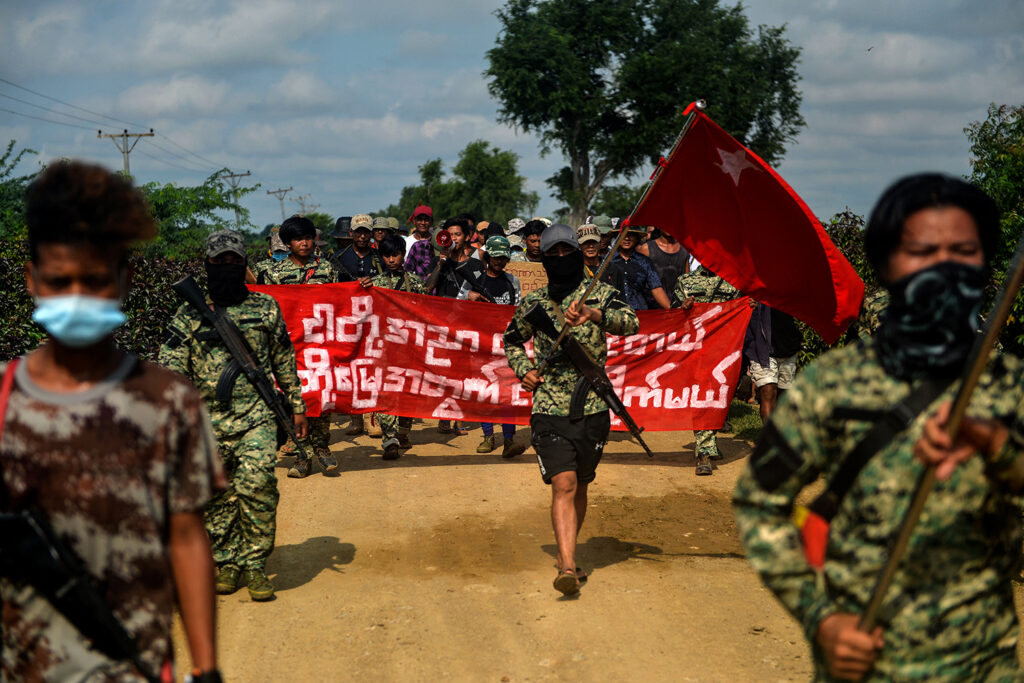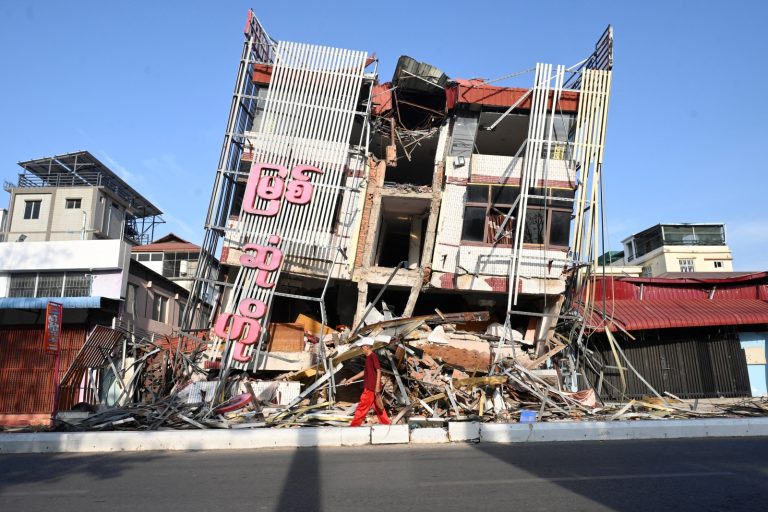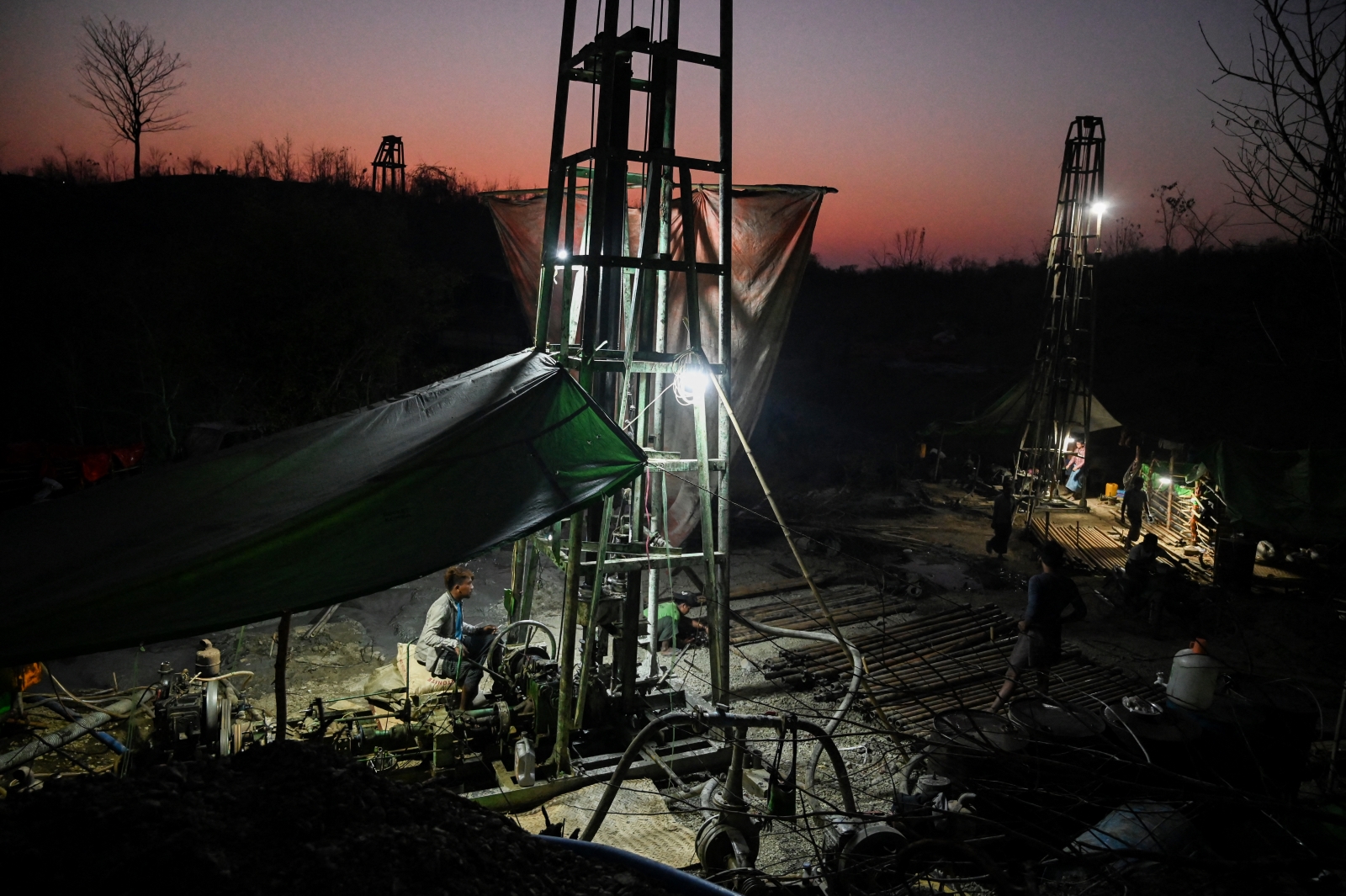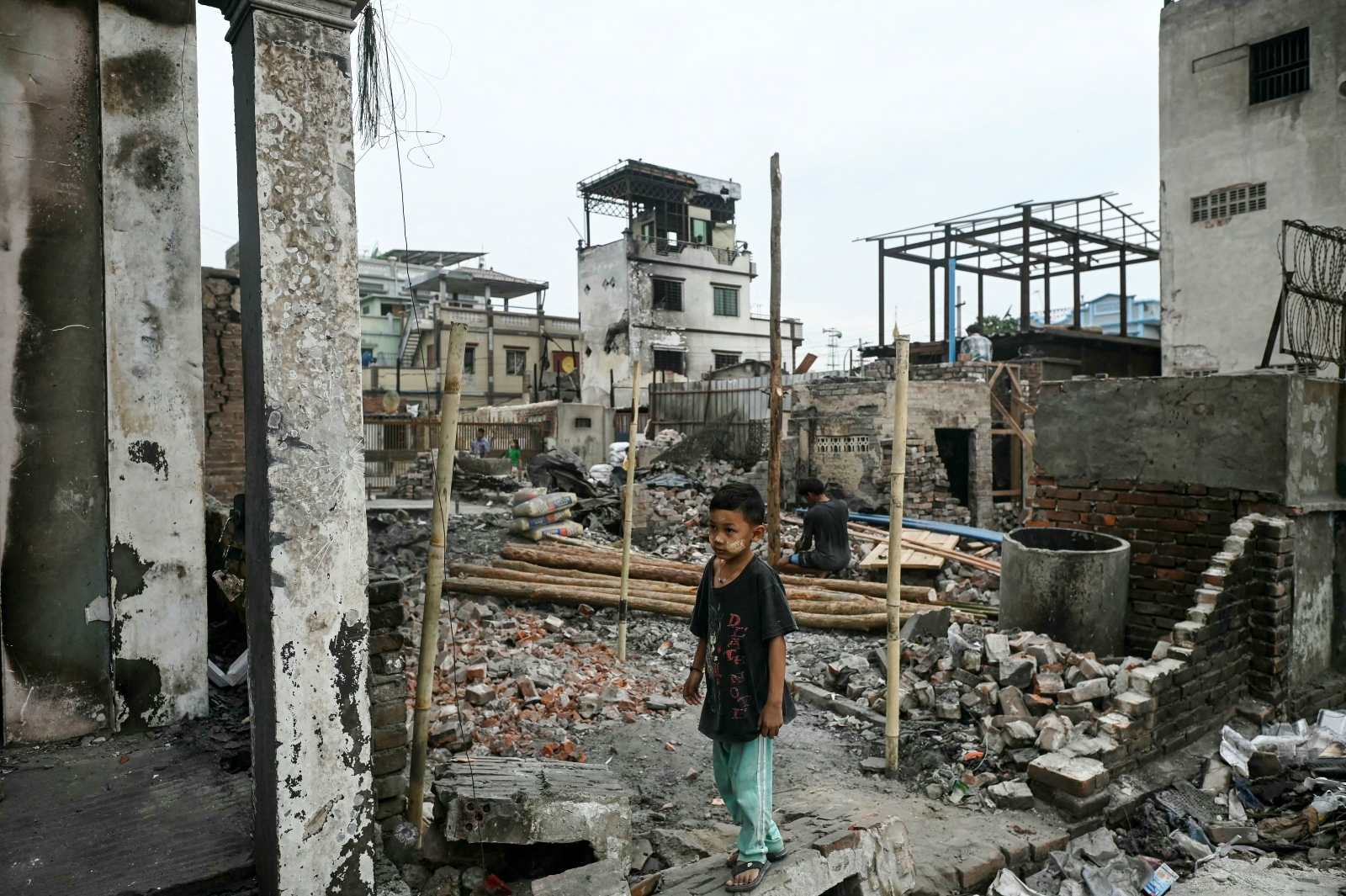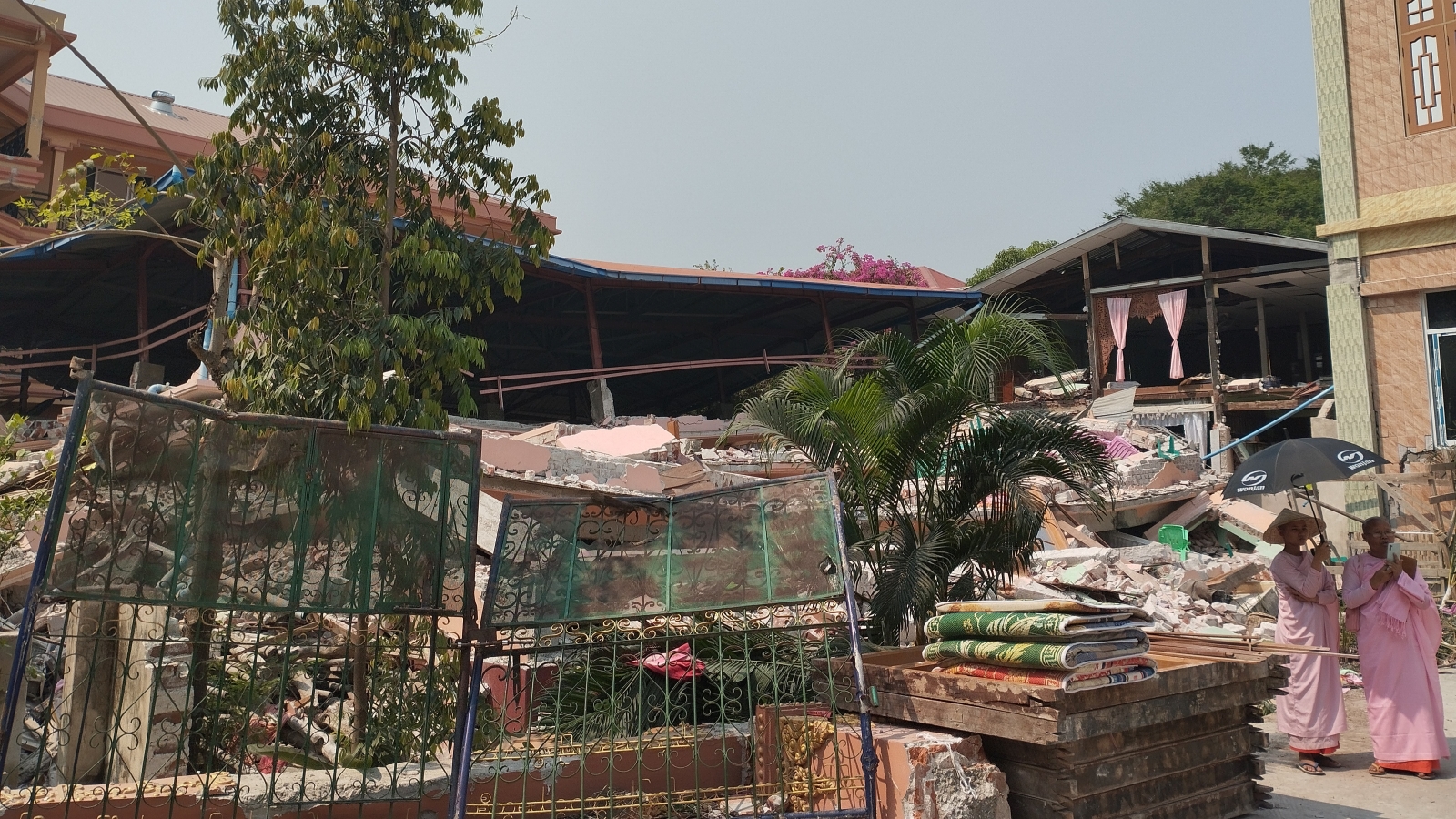The parallel government has unveiled a paramilitary task force to combat abuses by the military and different resistance groups, but while many welcome such a force, some question whether it can enforce the law fairly.
By FRONTIER
Around 20 young men cradle guns while crawling across the mud of a military training field. At sudden intervals, four trainers in uniform fire rifles into the ground close to the young men, who keep their heads down and continue moving forward.
The exercise, seen in a video shot in January, was part of a three-month training programme led by a Chin-American who served in the United States Marines, and assisted by an ethnic armed group.
The training finished on March 18, producing 200 soldiers to serve in the new Security and Special Task Force, formed under the home affairs ministry of the National Unity Government, a parallel administration appointed by lawmakers deposed in the 2021 military coup.
Ko Wai, deputy head of the SSTF, said the training programme was “very intense”.
“Trainers shot with real bullets very close to the trainees,” he said, adding that the most difficult part was a 48-hour Hell Session, where trainees were constantly subjected to gruelling physical challenges with no sleep and hardly any food.
He said if the men slacked off due to exhaustion, they were beaten. “We do this so they have the strength to face challenges when they’re on the ground,” Ko Wai said. “Out there, they will face things worse than this training session.”
The new task force, called the Security and Counter-Terrorism Department in Burmese, will take on rights abuses against civilians from all sides – the military regime, non-NUG aligned resistance groups, and People’s Defence Forces loyal to the NUG.
“We will take action and arrest people from the military who commit crimes, and we will arrest revolutionary forces who abuse unarmed people in NUG-controlled areas. This includes both local defence forces and the People’s Defence Forces,” Ko Wai explained.
But some have questioned how a group under the NUG can neutrally carry out this task, given tensions between PDFs and non-NUG groups, particularly in Sagaing Region, and allegations that the home affairs minister U Lwin Ko Latt has abused his position to build pocket armies personally loyal to him.
Activist Ma Zin Mar*, based in Sagaing’s Yinmabin Township, said such a task force is necessary to address growing abuses of civilians by resistance forces, but she worries it could create more division.
“I’m glad to hear that they will take action against members of armed forces who abuse people, but I’m also worried it will create a mess on the ground between the revolutionary forces,” she said, adding that non-NUG aligned groups already resent the People’s Security Teams, local police forces under the home affairs ministry, because they often try to assert their authority over independent groups.
‘Worse than the tiger’
Alongside the junta’s atrocities, there have been routine reports of abuses against civilians in Sagaing committed both by NUG-aligned forces and independent resistance groups.
Ko Zan Kyi*, a resident of a village in Wetlet Township under PDF control, said the new task force has to keep rogue resistance fighters in check.
“On the ground, some members of revolutionary groups abuse people. The NUG needs to take action in those cases,” said Zan Kyi.
He said in an incident in his village earlier this year, a soldier from the NUG-aligned Wetlet PDF shot and killed a woman in a fit of jealousy, because she was in a relationship with another woman.
“She was shot and killed in her own home,” said Zan Kyi. “It was very cruel. She did nothing wrong.”
In an incident that horrified the nation, members of an NUG-affiliated militia murdered seven scavengers in Chaung-U Township in 2022, allegedly raping the four females beforehand, including two who were underaged. It’s unclear if the perpetrators were ever held accountable.
In March this year, around 40 people were arrested in Salingyi Township while similarly scavenging metal scraps from an abandoned junta-linked factory, which resistance forces had declared off-limits to civilians. Other village residents reportedly came out to protest the arrests, and the PST responded by raiding the home of one of the protest leaders and beating her.
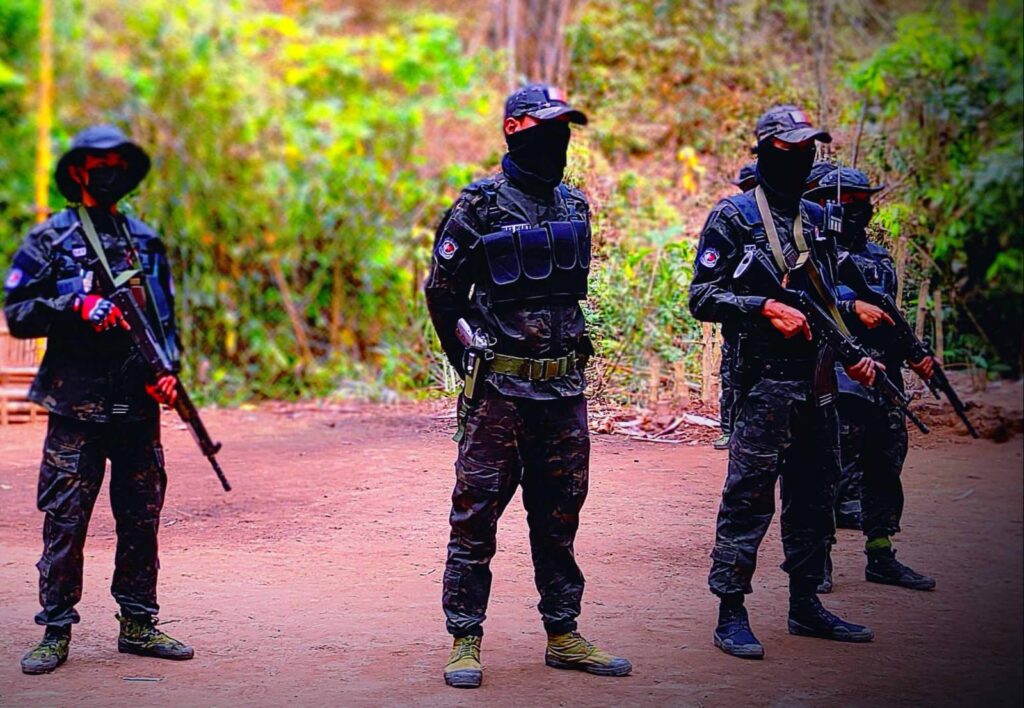
While not nearly as brutal, the attempt to quash a peaceful protest was reminiscent of the military’s own intolerance for dissent, which led it to massacre hundreds of demonstrators in 2021.
“This was very ugly to see,” Zin Mar said of the incident in Salingyi. “They acted like the military junta. If they want to arrest someone, they need to do it according to protocol. I feel they are trying to be bullies.”
“We don’t want a situation where we pray to Shin Gyi to protect us from the tiger, only for Shin Gyi to turn out to be even worse than the tiger,” she added, using a proverb that refers to a powerful but capricious nat spirit.
Non-NUG groups, meanwhile, have been accused of kidnapping for ransom in Sagaing and neighbouring Magway Region.
Some villagers say the proliferation of armed groups makes accountability more difficult, with local people unsure who is responsible for what.
“The names of the groups are different but their tasks seem the same,” said U Ba Tun*, a rice and bean merchant in Shwebo Township. “For example, the People’s Security Teams and People’s Defence Teams are different groups, but the way they work and their responsibilities seem to be the same.”
“It’s a mess,” he said. “If anything happens, we don’t know who we should contact first.”
Holding forces under the NUG’s home affairs ministry accountable is a particularly thorny problem. A PDF deputy company commander said home affairs minister Lwin Ko Latt oversees the Southern Military Command, despite being nominally in charge of the police, not the military.
“Some special task forces are under the [home] ministry, as well as the People’s Security Teams and now this counter-terrorism team,” he said.
The officer admitted it’s impossible for the NUG police force to take action unless it’s powerful enough to stand up to resistance armies, but said Lwin Ko Latt’s extensive powers and multiple roles effectively put him above the law.
“I don’t like that one of the ministers has huge armed powers of his own,” he said. “It’s very dangerous to have many armed groups under one person’s authority.”
He said the NUG should more clearly limit ministers’ authority, but moving against Lwin Ko Latt now would cause internal turmoil.
The home affairs ministry did not respond to Frontier’s request for comment, and Lwin Ko Latt could not be reached.
Resolution or escalation?
While multiple sources in Sagaing consider the new task force necessary, many share activist Zin Mar’s concerns that it could exacerbate problems between resistance groups, particularly in areas of Sagaing that have seen long-simmering tensions between PDFs and local defence forces not aligned with the NUG.
“We’re worried that their anti-terrorism group will target LDFs,” said the leader of an LDF in Shwebo Township.
“If they label us as terrorists, it would be a big problem leading to shootouts. We would like to know what their definition of a terrorist is,” he said.
Ko Wai admitted the SSTF’s mission won’t be easy to fulfil, both because it will need to win over public support and because it will need to take on other, powerful armed groups.
“If we’re weak militarily, we won’t be able to act against the stronger armed groups. That’s why we need to make our force stronger than the others. We understand that guns hold the power on the ground,” he said.
Both NUG and non-NUG groups have managed to escape punishment through sheer strength of arms. The Myanmar Royal Dragon Army, one of the most powerful non-NUG groups in the country, allegedly beat a PDF supporter and torched his property, but when NUG officials tried to investigate the incident, they were held at gunpoint and forced to retreat.
In another infamous incident, NUG-aligned Yinmabin PDF leader Bo Thanmani was accused of several extrajudicial killings of civilians and resistance fighters. He refused to cooperate with an investigation, instead resigning from the NUG’s chain of command, before returning to it months later with no resolution to his case.
Zin Mar said the SSTF’s legitimacy will hinge on whether it’s acting fairly or abusing its position to target non-NUG groups.
“There can be bad people in PDFs and LDFs, so the task force needs to enforce the law against both groups in an unbiased manner,” she said.
Ko Wai said the SSTF will not make politically motivated arrests, and will clear any arrests beforehand with the NUG’s home affairs and defence ministries. It will then contact the leaders of the PDF or LDF in order to negotiate the surrender of the offender.
“If the negotiation doesn’t go well, we will take action,” he said, explaining they will arrest the suspect even if it means clashing with the other resistance group.
Ko Wai said after the person is arrested, they will go through the NUG’s judicial process.
“The SSTF will not punish them. We will take them to court to be tried by the NUG. Everything will be done within the framework of the law.”
*indicates the use of a pseudonym for security reasons


